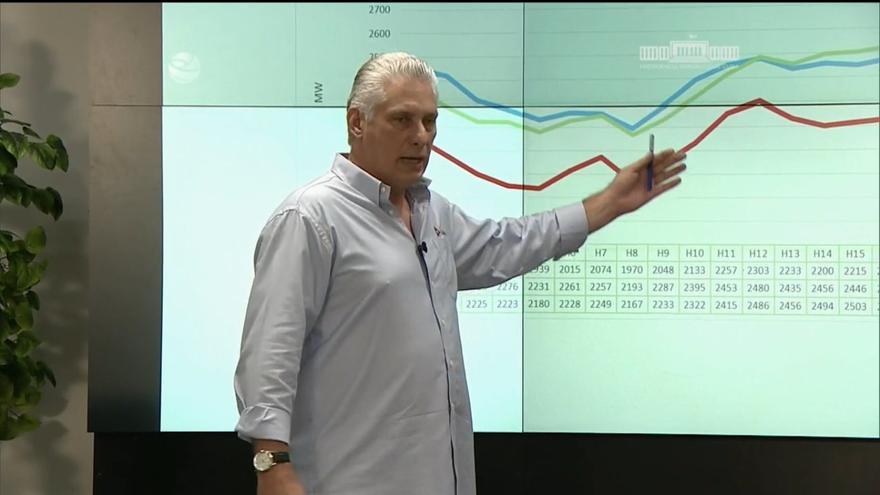
![]() 14ymedio, Reinaldo Escobar, Havana, 17 June 2022 — I have listened patiently, even with due respect, to Miguel Díaz-Canel’s presentation this Thursday, where he had the purpose of convincing the television audience – that is the Cuban people – that the problems that the country faces with electricity generation are not the fault of the Government, but of a set of circumstances that includes “the criminal blockade,” the difficulties of international trade derived from the pandemic and other causes.
14ymedio, Reinaldo Escobar, Havana, 17 June 2022 — I have listened patiently, even with due respect, to Miguel Díaz-Canel’s presentation this Thursday, where he had the purpose of convincing the television audience – that is the Cuban people – that the problems that the country faces with electricity generation are not the fault of the Government, but of a set of circumstances that includes “the criminal blockade,” the difficulties of international trade derived from the pandemic and other causes.
I must confess that, when I saw him in front of a graph explaining the details of the nominal power and the available power of the different electricity generation units in the country, it brought to mind that historic appearance by Fidel Castro, pointer in hand, in front of a map of Cuba, explaining how the cane from certain agricultural areas would be milled by other mills, a little further away, in order to guarantee the production of those ten million tons of sugar that nearly wrecked the island for good and that, ultimately, were never achieved.
The analogy may be forced, but the truth is that both that illusory purpose of the ten million tons, and this one of guaranteeing the generation of electricity, are marked by the same brand: voluntarism.
The oil that is extracted from the Cuban subsoil contains components that are aggressive for the boilers of the thermoelectric plants. It may be sulfur, I don’t know, I refuse to give technical details, but if you don’t believe me, check the details.
Someone, whose name I don’t want to remember, decided one bad day that the country didn’t have to depend on oil exports to generate electricity. It was thus that, contrary to the opinion of many specialists, the criterion of using national crude oil was imposed, as if it were a patriotic challenge, as if the machines understood the need to be poisoned, corroded in the name of a demand for sacrifice.
Our oil, that of the native soil, is efficient to produce asphalt and, perhaps, to obtain other derivatives, but when it enters the arteries of a thermoelectric plant, designed for another type of fuel, it leaves a crust on its internal walls that, sooner or later, early, it must be removed because it reduces the capacity of the boilers and because, in addition, it ends up damaging the metals. This undesirable scum makes it necessary to reduce the frequency of maintenance. If “normally” maintenance would have to be done every few years, with that fuel it must be carried out every few months, otherwise blackouts occur.
I clarify that I am not a specialist in the subject and I am mentioning the generalities that occur to a layman.
Maintenance is a sacred word in industrial mechanics. It is done with the purpose of not having to make repairs.
The producers of large machinery, such as refineries or thermoelectric plants, guarantee the operation of their product as long as the maintenance protocols are followed. Every few hours, days, months or years of work, a certain part must be replaced. If this requirement is not met, the sugar mill producers do not feel responsible for the breakdowns or damage. It happens with airplanes and with other contraptions.
When, due to political will, a work regimen is imposed on a machine or a tool that is detrimental to it, maintenance becomes repair.
Everyone who has participated in a maintenance task in Cuba knows how much the threads of each nut suffer, or worse still, how many nuts are lost and left as disposable. “Three are enough where five played.” When these accumulate, year after year, the effects have consequences.
But machines are not only asked to have the vocation of sacrifice to run on a fuel that annihilates them. The requirement is transferred to the operators, who are required to have a greater number of hours of continuous work to put a plant into operation against its technical requirements.
The sacrifice, finally, falls on the consumers, who are being asked to put their revolutionary spirit into action and turn off one, or better two, light bulbs, because that allows the country the luxury of energy sovereignty.
The scum that accumulates on the walls of the boilers cannot be an obstacle to the will to win.
*Translator’s note: “Escoria” — scum — a word favored by Fidel Castro to refer to ‘counterrevolutionaries’ or ‘enemies’ of the Revolution, is still in use by others in the same context. The word is repeatedly used here as a play on words.
____________
COLLABORATE WITH OUR WORK: The 14ymedio team is committed to practicing serious journalism that reflects Cuba’s reality in all its depth. Thank you for joining us on this long journey. We invite you to continue supporting us by becoming a member of 14ymedio now. Together we can continue transforming journalism in Cuba.
